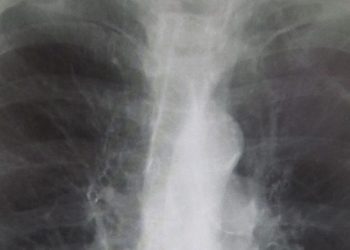Shorter course of antibiotics for community acquired pneumonia equally effective
1. Based on this randomized controlled trial conducted in Spain about hospitalized patients with community acquired pneumonia, treatment with a shorter course of antibiotics driven by clinical factors was equally effective compared with a regimented, longer course of antibiotics.
2. Since the majority of the patients received fluoroquinolone-class antibiotics and since the patients were limited to four teaching hospitals in Spain, the results of the study may not be generalizable to other countries, especially if antibiotic choices are different.
Evidence Rating Level: 1 (Excellent)
Study Rundown: Community acquired pneumonia (CAP) represents a common reason for admission to hospital. Duration of therapy has largely been determined by arbitrary minimum treatment durations. Longer than necessary treatment courses contribute to antibiotic resistance, Clostridium difficile infections, adverse drug events, and overall costs of medical care. The Infectious Diseases Society of America currently recommends a minimum of 5 days of therapy for CAP with discontinuation if patients are afebrile for 48 to 72 hours, and do not have more than one instability criteria (hypotension, tachycardia, tachypnea, or hypoxia). This randomized controlled trial sought to evaluate the efficacy of the IDSA recommendations in a real world setting at four teaching hospitals in Spain.
Most general patients with CAP were included and randomized to a control group, in which duration of therapy was determined by physicians or intervention group, in which the duration of therapy was based on the IDSA recommendations. The intervention group had half the median duration of antibiotic therapy compared with the control group (5 vs 10 days). Both groups had similar outcomes in terms of clinical success rate and pneumonia symptom resolution. The major strength of the study included the wide inclusion criteria for the CAP patients. The major weaknesses of the study included inclusion of a single country, which limits generalizability to the US. Also, the antibiotic of choice for most patients was a fluoroquinolone and results may not be generalizable to populations who receive a β-lactam (with or without macrolide) for empiric CAP therapy.
Click to read the study, published today in JAMA Internal Medicine
Relevant Reading: Antibiotic Treatment Strategies for Community-Acquired Pneumonia in Adults
In-Depth [randomized controlled trial]: This study included a population (n = 312) of patients admitted to hospital with community-acquired pneumonia (no recent hospitalizations, non-nursing home resident) at four teaching hospitals in Spain. Patients were excluded if they were immunocompromised, were admitted to an intensive-care unit, or died in the first 7 days. At day 5 patients were randomized to either control group, in which duration of therapy was determined by the physician, or the intervention group, in which the duration of antibiotics was based on IDSA recommendations. In the intervention group, all patients who had at least 5 days of antibiotics had their therapy discontinued if patients were afebrile for 48 hours, and had no more than one of the following clinical parameters: systolic blood pressure less than 90 mm Hg, heart rate greater than 100/min, respiratory rate greater than 24/min, oxygen saturation less than 90%, or PaO2 less than 60 mm Hg on room air. Antibiotic choice was physician dependent (80% fluoroquinolone for both arms). Primary outcomes were clinical success rate (resolution or improvement of symptoms off antibiotics) and pneumonia symptom severity as assessed by an 18-item CAP symptom questionnaire at day 10 and 30.
At day 10 there was no difference in clinical success rate (48.6% vs. 56.3%, p = 0.18) or symptom severity scores (18.6 vs. 17.9, p = 0.69) between the two groups. At day 30 there was also no difference in clinical success rate (p = 0.33). The intervention group had shorter median duration of therapy than the control group (5 vs 10 days, p < 0.001).
Image: PD
©2016 2 Minute Medicine, Inc. All rights reserved. No works may be reproduced without expressed written consent from 2 Minute Medicine, Inc. Inquire about licensing here. No article should be construed as medical advice and is not intended as such by the authors or by 2 Minute Medicine, Inc.







